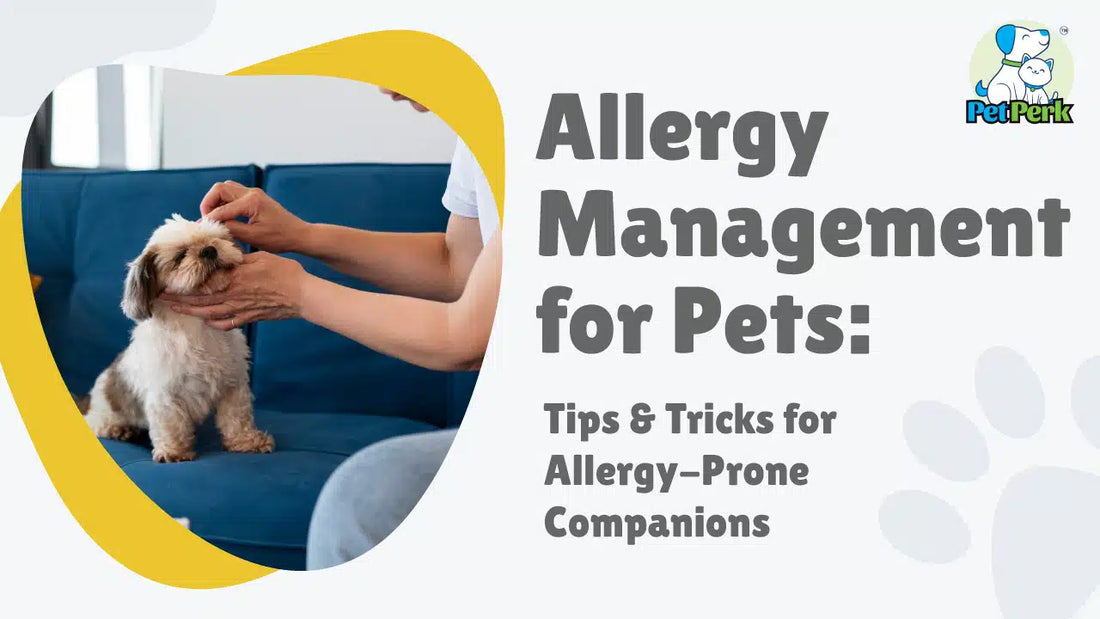Pet allergies in animals are common and can affect various species, including dogs, cats, birds, and even smaller pets like rabbits or rodents. Allergies in pets are the body’s response to specific allergens, triggering an immune system reaction that leads to various symptoms. These allergens can be diverse, including but not limited to pet dander, dust mites, pollen, certain foods, and even certain types of grooming products.
The prevalence of pet allergies among animals is significant. Just like humans, pets can suffer from allergic reactions that can range from mild to severe. Allergies in pets can manifest in different ways, often through symptoms such as itching, redness, skin irritations, sneezing, coughing, and, in more severe cases, respiratory distress. It’s essential to note that pet allergies can significantly impact the overall well-being and comfort of our beloved animal companions.
As pet owners, recognizing the signs and understanding the prevalence of these allergies is crucial for providing timely care and effective management strategies. Allergies in pets can be both distressing for the animal and challenging for pet owners. However, with the right approach, these allergic reactions can be managed and mitigated to ensure the pet’s quality of life is optimized.
Understanding and acknowledging the prevalence and impact of pet allergies is the first step in effectively managing them, and ensuring our pets lead healthy and comfortable lives. This blog aims to delve into various products and strategies designed to assist pet owners in minimizing the impact of allergies on their cherished pets. By implementing these measures, pet owners can offer their pets the best care, reducing the discomfort caused by allergies and ensuring their furry, feathery, or scaly friends can thrive despite these challenges.
Identifying Allergy Symptoms in Pets
Identifying allergic reactions in pets is essential for timely intervention and proper management. Symptoms can vary widely among animals and may be influenced by the specific allergen affecting them. Here’s a breakdown of the common signs of pet allergies and the importance of seeking veterinary guidance for accurate diagnosis:
Common Signs of Pet Allergies:
- Itching and Scratching: One of the most noticeable symptoms in allergic pets is persistent itching. You might observe your pet excessively scratching or biting its skin, paws, or other body parts.
- Sneezing and Respiratory Issues: Allergens like pollen or dust might trigger sneezing or coughing in allergic pets, similar to how humans react to environmental allergens.
- Skin Issues: Allergies often manifest as skin problems, leading to redness, rashes, flaky or scaly skin, and in severe cases, open sores or infections.
- Ear Infections: Frequent ear infections or ongoing ear irritation can sometimes be a sign of allergic reactions in pets.
Variations in Symptoms Based on the Allergen:
- Food Allergies: These often result in gastrointestinal issues like vomiting or diarrhea, as well as skin reactions.
- Environmental Allergens: Pollen, mold, dust mites, or grass might cause respiratory issues and skin problems.
- Flea Allergies: Pets can develop allergic reactions to flea bites, leading to intense itching and skin irritation.
Importance of Veterinary Consultation for Accurate Diagnosis:
Seeking professional veterinary advice is crucial for accurate diagnosis and effective management of pet allergies. Veterinarians are trained to differentiate between various skin conditions, infections, and allergic reactions. They might conduct specific tests to identify the allergen causing the reaction.
Veterinarians might recommend:
- Skin tests: Similar to those used in human allergy testing.
- Elimination diets: To identify potential food allergens.
- Blood tests: To determine the specific allergens affecting the pet.
Accurate diagnosis is essential as it forms the basis for crafting an effective management plan. Identifying the allergen allows for the implementation of targeted strategies to reduce exposure and alleviate symptoms, ensuring a better quality of life for pets suffering from allergies.
Strategies to Reduce Allergens in the Home Environment
Maintaining a clean home environment is pivotal in managing pet allergies. Here are some effective strategies that pet owners can employ to minimize allergens and create a healthier space for their furry companions.
- Regular Cleaning Routines to Minimize Pet Dander: Regular cleaning is paramount in reducing the buildup of pet dander, a common allergen. Employing pet-friendly cleaning products available at local pet shops or specialized Pet Care Homes can help in maintaining a clean environment without exacerbating allergies.
- Importance of Vacuuming and Using HEPA Filters: Vacuuming with a high-efficiency particulate air (HEPA) filter is crucial in removing pet dander and other allergens from carpets, floors, and furniture. This method significantly reduces airborne particles and ensures a cleaner, healthier home. Investing in a quality vacuum cleaner equipped with a HEPA filter can be beneficial for pet owners, and such tools can often be found in dedicated Pet Shops or even at Pet Spa outlets known for catering to pet hygiene.
- Creating Pet-Free Zones within the Home: Establishing specific pet-free zones in the house can provide relief for individuals who are particularly sensitive to pet allergens. By designating certain areas where pets aren’t allowed, such as bedrooms or certain living spaces, allergic reactions can be minimized. These strategies can be integrated into the home, guided by insights from Pet Training and Training Centres, where techniques for establishing boundaries can be learned.
- Washing Pet Bedding and Toys Frequently: Regularly washing pet bedding, blankets, and toys helps eliminate accumulated pet dander. Using hypoallergenic detergents, available at pet shops or through specialized Pet Care Homes, ensures thorough cleaning without triggering allergic reactions in pets or their owners.
Lifestyle Adjustments for Allergy-Prone Pets
Managing allergies in pets goes beyond environmental changes; adopting a holistic approach to their lifestyle plays a significant role in alleviating symptoms and promoting their overall well-being.
- Importance of a Balanced Diet and Proper Nutrition for Allergy-Prone Pets: A balanced diet tailored to meet the specific needs of allergy-prone pets is vital in managing their condition. Opting for specialized, hypoallergenic food available in Pet Shops or recommended by Pet Care Homes can reduce the risk of allergic reactions triggered by certain ingredients. Consulting with a veterinarian or a pet nutritionist can provide valuable insights into selecting the most suitable diet for your pet’s unique needs.
- Regular Exercise and Mental Stimulation for Overall Pet Health: Regular exercise and mental stimulation are crucial for maintaining the overall health of allergy-prone pets. Engaging in activities suitable for your pet’s breed, age, and health condition can strengthen their immune system and reduce stress, contributing to a better quality of life. Enrolling pets in exercise programs or visiting Pet training centers can provide tailored activities designed to enhance their physical and mental well-being.
- Stress Reduction Techniques for Pets Prone to Allergies: Stress can exacerbate allergic reactions in pets. Implementing stress reduction techniques, such as creating a calm and comfortable environment, providing adequate relaxation, and using tools such as calming pheromone diffusers, available in Pet Spa establishments, can help alleviate stress and subsequently reduce the frequency and severity of allergic symptoms in pets.
Managing pet allergies is an essential aspect of caring for our beloved animal companions. In the pursuit of managing pet allergies effectively, it’s crucial to access the right products and resources. Pet Perk, a distinguished provider of pet products at Pet Perk, offers a range of safe, pet-friendly products specifically designed to keep pets safe from allergy triggers. Our commitment to producing safe and effective products can significantly aid pet owners in maintaining a healthier life for their pets, minimizing allergic reactions, and ensuring their comfort and well-being.
Understanding, acknowledging, and actively managing pet allergies is not just about addressing the symptoms; it’s about creating an environment where our pets can thrive despite their sensitivities. By employing a combination of these strategies, seeking guidance from reputable sources, and utilizing products designed for their well-being, pet owners can significantly improve the quality of life for their beloved, allergy-prone pets.

